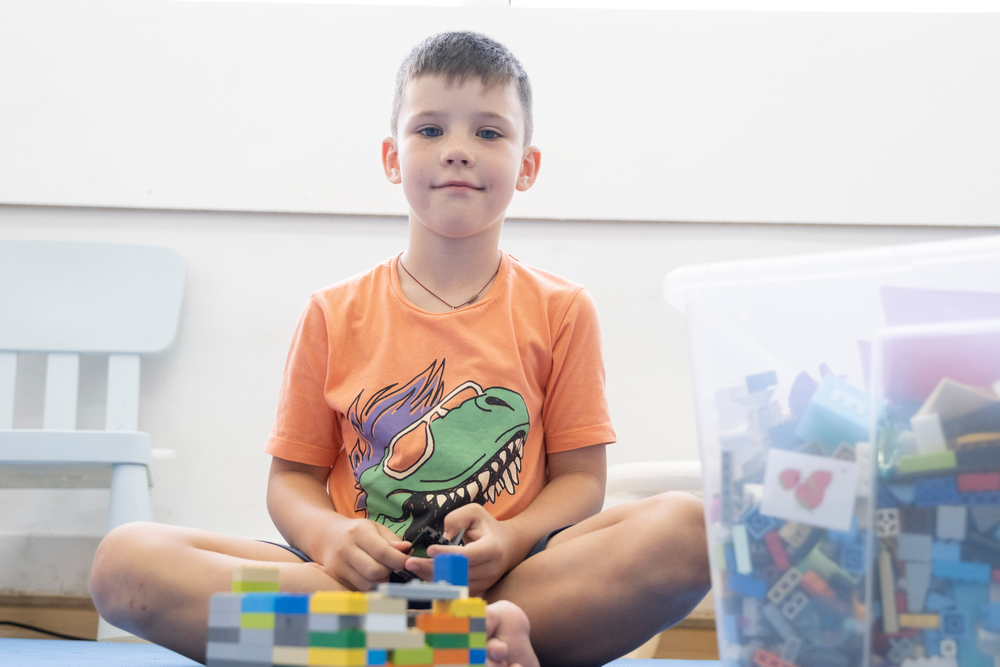
Five ways the Global Refugee Forum will deliver education for vulnerable children
Education in emergencies, Refugees and internally displaced people
A roundup of news from the big event in Switzerland, where key pledges were made to help vulnerable refugee children into school.
Education was a winner at the first Global Refugee Forum this week. More than 130 separate pledges on education were made by governments, donors, UN agencies, NGOs and businesses at the event in Switzerland.
Half of all refugees are under 18 and 3.7 million of them are not in school. Last week Their News previewed the Global Refugee Forum and said it offered hope of real action on the refugee education crisis. And ahead of the Geneva event, Theirworld announced it was expanding its education support for refugee children on the Greek Aegean Islands.
When UN Secretary-General António Guterres asked young refugees at the forum what the world can do most to help, Hina Shikhani from Afghanistan said: “Investing in refugee education is the most important thing – because quality education is not a luxury but a basic human right.”
This week’s news roundup is a Global Refugee Forum special – focusing on some of the key announcements from Geneva.
Joint pledge to support refugee education
Three major organisations announced a joint pledge to work more closely to support education for refugees and their communities.
The World Bank, Education Cannot Wait (ECW) and the Global Partnership for Education (GPE) promised to come up with a plan by the middle of 2020 of how to achieve this.
The World Bank Group is the largest financier of education in the developing world. ECW is the fund for education in emergencies, while GPE supports school systems in the world’s poorest countries.
In their joint pledge, they said: “We recognise the urgent need for more and better external assistance to provide education to refugee and host community children, and that we have a specific role to play.
“We therefore commit to work together to increase and improve the financial support and technical assistance we provide to countries hosting large refugee populations to meet their educational needs through their national education systems.”
Education Cannot Wait help for Mali, Niger and Yemen
???? “Refugee children have a right to a quality education so that they have a pathway to be empowered, and change the destiny of their lives and that of their communities and society.” @EduCannotWait Director Yasmine Sherif shares this message of solidarity at the #RefugeeForum pic.twitter.com/JMZ9rU00XY
— UNHCR, the UN Refugee Agency (@Refugees) December 16, 2019
ECW announced new funding support for education in emergencies responses in Mali, Niger and Yemen.
The $3.7 million for Mali and Niger – where the humanitarian emergency is getting worse – will reach more than 160,000 children and youth and expand on ECW’s initial $6 million grant in July.
In Yemen, the $3 million first emergency response will support education for girls and boys affected by the escalating crisis in the Western Coastal governorates.
It will reach over 14,000 internally displaced and crisis-affected children in Hodeidah, Hajjah and Taizz, with a special focus on girls and children with disabilities.
GPE unlocks up to $250 million in rapid funding
GPE approved the expansion of its accelerated funding mechanism. The move will unlock up to $250 million in rapid funding for education in countries experiencing humanitarian emergencies during 2020.
The focus will be on the poorest and most marginalised children, including refugees, internally displaced children and asylum seekers.
“The extended role of GPE’s accelerated funding is crucial to assisting countries to respond more quickly and efficiently to crises. The swift access to funding will ensure that children caught up in crises do not have to forgo their right to go to school and learn,” said Julia Gillard, GPE Board Chair.
Companies pledge $250m for education and skills
More than 30 companies including Ikea, Lego and Vodafone pledged $250 million at the forum to do more to help refugees get access to education and employment.
Swedish furniture retailer Ikea said it would support 2,500 refugees through job training and language skills in 30 countries by 2022, backed by a five-year commitment of 100 million euros ($111.5 million)
Vodafone said it would expand a digital education programme that brings online teaching tools into refugee camps in east Africa. The programme – which is run in eight refugee camps in Kenya, Tanzania, the Democratic Republic of Congo and South Sudan – will grow to reach 500,000 young refugees by 2025.
Ahead of the forum, the LEGO Foundation awarded a $100 million grant to promote play-based, early learning solutions for pre-primary and primary school-aged children impacted by the humanitarian crises in East Africa.
Among other announcements...
Did you know 35% of refugee children were not attending primary school?
We are launching a pledge to ensure quality #education for all #refugees. Will you support it?https://t.co/j2l0pgWmPg #WithRefugees#RefugeeForum pic.twitter.com/mDuZ4RaNOU
— UNESCO ????️ #Education #Sciences #Culture ???????????? (@UNESCO) December 17, 2019
UNESCO promised to strengthen national education systems by providing countries with expertise and technical guidance for policy design, implementation and planning support for the inclusion of refugee.
The UN agency said it would complete the piloting of the UNESCO Qualifications Passport in Zambia, Iraq, and Colombia by the end of 2020. The passport is for refugees or vulnerable migrants who claim to have completed or partially completed upper secondary school studies and who often have insufficient or missing documentation.
Meanwhile, the Global Education Cluster, the UN refugee agency UNHCR and the Inter-Agency Network for Education in Emergencies jointly pledged to strengthen coordination in the education sector.
They said this would be achieved through joint training and capacity strengthening to minimise the amount of time refugee children spend being out of school.
More news

